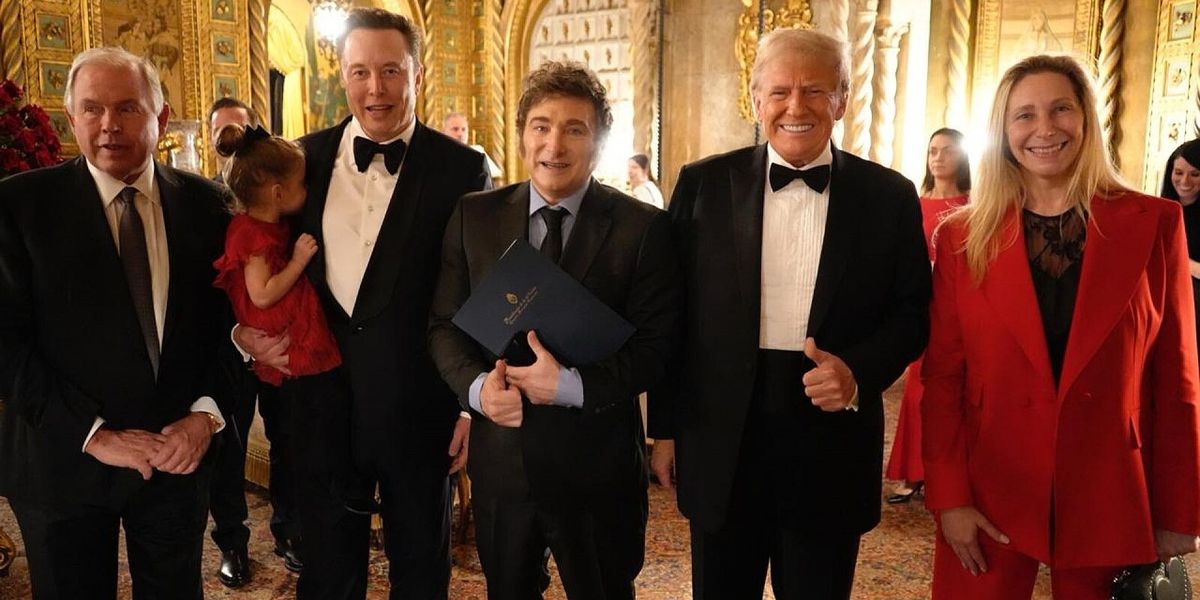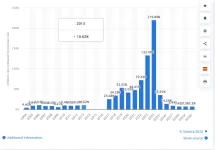- Joined
- Aug 30, 2019
- Messages
- 16,105
- Reaction score
- 10,906
- Location
- Hobbs End
- Gender
- Male
- Political Leaning
- Socialist

Trump Admin Responds to Milei’s Failed Libertarian Policies With a US Taxpayer Bailout for Argentina | Common Dreams
The Trump administration has held up Argentina's radical libertarian president, Javier Milei, as a model for their own governance. Now, as his economy collapses under the weight of his austerity program, he's coming to the US for a taxpayer-funded bailout.
 www.commondreams.org
www.commondreams.org
Argentina is on the verge of economic collapse because -- you guessed it, Libertarian policies. Trump is preparing a massive bail out package for them. You can't pick winner and losers, but you apparently you can bail out the losers.
As of September 25, 2025, the Trump administration is preparing a financial intervention to stabilize Argentina’s collapsing economy, centered on a proposed $20 billion currency swap line through the U.S. Treasury’s Exchange Stabilization Fund. This move supports Argentine President Javier Milei, a far-right libertarian and close ideological ally of Donald Trump, whose radical austerity policies have triggered economic contraction, soaring unemployment, and widespread poverty. The bailout is widely interpreted not as a strategic economic decision but as a political effort to prop up a loyal foreign leader ahead of Argentina’s October 26 legislative elections, thereby protecting the credibility of Trump’s own Milei-inspired domestic agenda.
Background and Milei’s Economic Policies
Javier Milei, elected in late 2023, launched an aggressive libertarian economic program dubbed “chainsaw” austerity, aimed at dismantling state institutions and curbing inflation through drastic measures. These included slashing energy and transportation subsidies, halting public infrastructure projects, freezing wages and pensions, and firing tens of thousands of public employees. Milei, who describes himself as an “anarcho-capitalist,” initially devalued the peso by 50%, causing inflation to spike from 150% to nearly 300% annually. By late 2024, inflation had fallen to around 30%, but this was achieved not through structural reform but by reinstating a dollar peg—a policy long criticized as unsustainable and used by previous administrations.
Despite claims of success, Milei’s reforms have devastated Argentina’s economy. By early 2025, the country began rapid deindustrialization, with clothing stores closing, tens of thousands of jobs lost, and over half the population falling into poverty. Public sector workers, pensioners, and teachers report being unable to make ends meet, while a favorable exchange rate has enabled affluent Argentines to vacation abroad, creating a stark economic divide.
Trigger for the Bailout
The immediate catalyst for the U.S. intervention was a political and financial crisis triggered by Milei’s party’s poor performance in provincial elections in Buenos Aires, Argentina’s most important province. His party lost by 13 points, far worse than expected, signaling potential losses in the October 2025 midterms. This outcome, combined with a corruption scandal involving Milei’s sister (his chief of staff), who was accused of taking kickbacks from pharmaceutical contracts, eroded investor confidence.
Markets reacted swiftly: the peso lost a third of its value in a month, and Argentina’s central bank spent over $1.1 billion in three days defending the currency, depleting its foreign reserves. Dollar-denominated bond prices plummeted, and financial panic set in, threatening a full-blown currency crisis.
U.S. Response and Proposed Measures
In response, U.S. Treasury Secretary Scott Bessent announced that the U.S. stands ready to provide emergency financial support, declaring “all options for stabilization are on the table”. Specific measures under consideration include:
Bessent emphasized that this support comes without conditionality, framing Argentina as a “systemically important U.S. ally in Latin America” and pledging to do “whatever it takes” to stabilize its markets, echoing former ECB chief Mario Draghi. This marks a significant departure from Trump’s “America First” rhetoric, which traditionally opposes foreign bailouts.
- A $20 billion currency swap line, allowing Argentina’s central bank to access U.S. dollars.
- Direct purchases of Argentine pesos to stabilize the exchange rate.
- Purchases of Argentina’s U.S. dollar-denominated sovereign debt using the Treasury’s Exchange Stabilization Fund.

